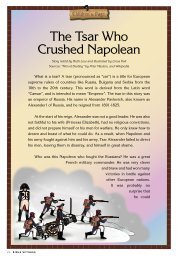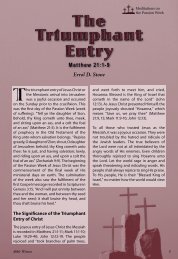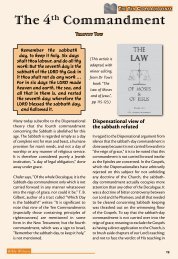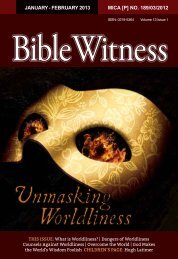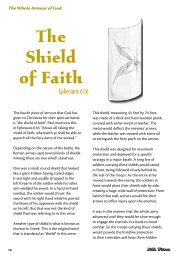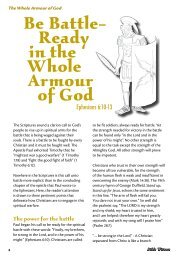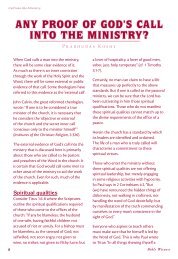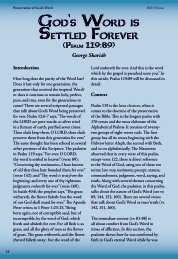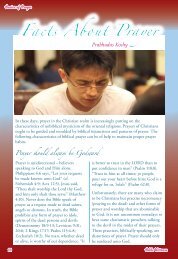Missions - Bible Witness
Missions - Bible Witness
Missions - Bible Witness
- No tags were found...
Create successful ePaper yourself
Turn your PDF publications into a flip-book with our unique Google optimized e-Paper software.
<strong>Missions</strong><br />
<strong>Bible</strong> <strong>Witness</strong><br />
1
<strong>Missions</strong><br />
CONTENTS<br />
Editor<br />
Prabhudas Koshy<br />
Publishing & Circulation<br />
Co-ordinator<br />
Lok Kwok Wah<br />
Technical Editors<br />
Adrienne Foo, Carolyn Koshy, Jenny Lok<br />
Lok Kwok Wah & Mah Lean Choo<br />
Cover Design<br />
Melissa Neo<br />
Layout<br />
Kenneth Wong<br />
Illustrations<br />
Sharon Ng<br />
Publisher<br />
<strong>Bible</strong> <strong>Witness</strong> Media Ministry of<br />
Gethsemane <strong>Bible</strong>-Presbyterian Church,<br />
Singapore<br />
Printer<br />
Chung Printing<br />
Contact Information<br />
By mail:<br />
<strong>Bible</strong> <strong>Witness</strong> Media Ministry<br />
510 Geylang Road, #02-06<br />
Singapore 389466<br />
Tel: (65) 6741-1910 Fax: (65) 6741-1016<br />
Web-site: www.biblewitness.com<br />
E-mail: editor@biblewitness.com<br />
MISSIONS<br />
3<br />
9<br />
15<br />
17<br />
20<br />
24<br />
Gospel <strong>Missions</strong>: Hazardous,<br />
But Not in Vain!<br />
Promises for <strong>Missions</strong><br />
Theology and <strong>Missions</strong><br />
Giving to <strong>Missions</strong><br />
The Struggles of <strong>Missions</strong><br />
Things that Wreck Short-Term<br />
<strong>Missions</strong><br />
CHILDREN’S PAGE<br />
25<br />
26<br />
<strong>Bible</strong> Trivia - Genesis 18<br />
God Provides a Graduation Suit<br />
SUBSCRIPTION INFORMATION<br />
The magazine is distributed free from 2006 onwards. “Freely ye have received, freely give” (Matthew 10:8).<br />
Postage and handling charges for 2 years (12 issues)<br />
Singapore / Malaysia: S$10.00 International<br />
*Surface Mail: S$14.00 (All Countries)<br />
*Air Mail: S$26.00 (Asia)<br />
S$34.00 (All Other Countries)<br />
International bank draft, money order or postal order drawn on a Singapore bank in Singapore dollars may be made<br />
payable to “<strong>Bible</strong> <strong>Witness</strong>.”<br />
LOVE-GIFT<br />
<strong>Bible</strong> <strong>Witness</strong> Media Ministry welcomes love-gifts from readers to meet the cost of publishing and distribution. The Ministry<br />
also sends the magazine freely to churches in poorer countries. Hence your generous support is much needed and greatly<br />
appreciated.<br />
USE OF ARTICLES<br />
The articles may be freely used for non-commercial purposes, so long as they are quoted verbatim, and the writer as well as<br />
the source identified.<br />
2 <strong>Bible</strong> <strong>Witness</strong>
<strong>Missions</strong><br />
Gospel <strong>Missions</strong>:<br />
Hazardous,<br />
But Not in Vain!<br />
Prabhudas Koshy<br />
7 principles for missionaries from Paul’s testimony in 1 Thessalonians<br />
When Paul wrote to the Christians in Thessalonica, he briefly<br />
summarized his Gospel attempt in their city this way, “For<br />
yourselves, brethren, know our entrance in unto you, that it was<br />
not in vain” (1 Thessalonians 2:1). His Gospel mission in Thessalonica did<br />
not last long because of the violent opposition. Nonetheless, he had nothing<br />
to regret in making that hazardous Gospel expedition into Thessalonica.<br />
Paul had his own conscience bearing witness to the integrity of his ministry.<br />
But he also appealed to the Thessalonians concerning the faithfulness and<br />
fruitfulness of his Gospel enterprise. Like him, his co-workers in the work of<br />
the Lord, Silas and Timotheus, also discharged their office: “For yourselves,<br />
brethren, know our entrance in unto you.” Matthew Henry comments, “It is<br />
a great comfort to a minister to have his own conscience and the conscience<br />
of others witnessing for him that he set out well, with good designs and<br />
from good principles; and that his preaching was not in vain.” Paul was not<br />
making any idle speculations. It was a sound fact that his Gospel mission<br />
bore much fruit regardless of all the harrowing experiences he encountered.<br />
Principles for a Successful Gospel Mission in Hazardous<br />
Conditions<br />
When we consider the opposition and hazards that Paul encountered in<br />
his mission attempts in Thessalonica and other cities, we may wonder what<br />
caused him to make the bold statement in 1 Thessalonians 2:1 that his coming<br />
to the Thessalonians was not in vain. Thankfully, Paul had clearly indicated<br />
what made his hazardous Gospel efforts very effective and fruitful.<br />
1. Minister by Preaching the Powerful Gospel<br />
The very first ingredient that Paul mentioned is found in the first chapter. He<br />
wrote in verse 5 about what constituted the Gospel endeavour in Thessalonica<br />
- “For our gospel came not unto you in word only, but also in power, and in<br />
the Holy Ghost, and in much assurance; as ye know what manner of men we<br />
were among you for your sake.”<br />
When Paul said, “Our gospel came . . . unto you in word,” he was referring<br />
to the preaching of the Gospel to the Thessalonians. He could not have<br />
been talking about the eloquence of the preachers who declared the Gospel.<br />
<strong>Bible</strong> <strong>Witness</strong><br />
3
<strong>Missions</strong><br />
He never claimed to be eloquent. In fact, he said he never attempted to be<br />
eloquent in his preaching. He wrote, “And my speech and my preaching was<br />
not with enticing words of man’s wisdom” (1 Corinthians 2:4a). Then, what<br />
did he mean by “our gospel came . . . unto you in word” He was simply<br />
saying that the Gospel was brought to them by clear preaching.<br />
Christian mission is all about preaching the Gospel faithfully and fervently.<br />
That is why Paul said elsewhere, “For though I preach the gospel, I have<br />
nothing to glory of: for necessity is laid upon me; yea, woe is unto me, if I<br />
preach not the gospel!” (1 Corinthians 9:16). To assume the responsibility of<br />
Christian missions and not to preach the Gospel is indeed woeful. Christian<br />
missions are not about merely doing charitable acts, though they are a<br />
necessary and beneficial undertaking. Preaching of the Gospel must be the<br />
pre-eminent task of every Christian mission.<br />
We should never be doubtful of the pre-eminence of preaching the Gospel.<br />
Paul said to the Thessalonians, “our gospel came not unto you in word only, but<br />
also in power.” Paul was absolutely sure the faithful preaching of the Gospel<br />
will have the divine power needed for the salvation of souls. In another letter<br />
to the Romans, he boldly declared his conviction about the effectiveness of<br />
the Gospel, “For I am not ashamed of the gospel of Christ: for it is the power<br />
of God unto salvation to every one that believeth; to the Jew first, and also to<br />
the Greek” (Romans 1:16). Likewise, he also mentioned to the Corinthians:<br />
“For the preaching of the cross is . . . unto us which are saved it is the power<br />
of God. . . . But unto them which are called, both Jews and Greeks, Christ<br />
the power of God, and the wisdom of God” (1 Corinthians 1:18, 24). Paul’s<br />
words remind us of Jeremiah’s description of God’s Word, “Is not my word<br />
like as a fire saith the LORD; and like a hammer that breaketh the rock in<br />
pieces” (Jeremiah 23:29). Paul’s sentiments about the efficacy of the Gospel<br />
is so overwhelming that he wrote, “Now thanks be unto God, which always<br />
causeth us to triumph in Christ, and maketh manifest the savour of his<br />
knowledge by us in every place” (2 Corinthians 2:14).<br />
2. Minister in the Power of the Holy Spirit<br />
In 1 Thessalonians 1:5, Paul not only said that “our gospel came . . . unto you<br />
in word . . . in power,” but also “in the Holy Ghost, and in much assurance.”<br />
This is certainly a proof that Jesus kept the promise that He made prior to<br />
His ascension – “But ye shall receive power, after that the Holy Ghost is<br />
come upon you: and ye shall be witnesses unto me both in Jerusalem, and in<br />
all Judaea, and in Samaria, and unto the uttermost part of the earth” (Acts<br />
1:8). Every missionary or preacher of the Gospel must trust and hope in the<br />
leading and empowering of the Holy Spirit, which is promised by the Lord<br />
Jesus Christ. It will be in vain to attempt anything in the Gospel endeavour<br />
by one’s carnal strength.<br />
4 <strong>Bible</strong> <strong>Witness</strong>
<strong>Missions</strong><br />
Paul was deeply convinced that the Holy Spirit was at work in Thessalonica,<br />
where he preached with much reliance on the Spirit’s strength and wisdom.<br />
It would have been in vain, if he had relied on his prowess.<br />
As they relied on the Holy Spirit to minister the Gospel, the ministry was<br />
also wrought “in much assurance.” The original Greek word for “assurance”<br />
can mean deep conviction. It is the Holy Spirit that brings about convictions<br />
of sin, the need for salvation, and Christ, the way to salvation. A deep<br />
conviction about the Gospel is an absolute necessity, both in the preacher’s<br />
heart and in the hearer’s heart, if the Gospel effort is to be successful. It is<br />
brought about by the inner working of the Holy Spirit (cf. John 16:8).<br />
3. Minister through an Exemplary Life<br />
One more thing that the Apostle Paul mentioned in 1 Thessalonians 1:5 is<br />
that “as ye know what manner of men we were among you for your sake.” He<br />
further elaborated this thought in the next verse, “And ye became followers<br />
of us, and of the Lord” (v. 6a). Later in chapter 2, Paul again reminded the<br />
Thessalonians of the missionaries’ exemplary life, “For our exhortation was<br />
not of deceit, nor of uncleanness, nor in guile. . . Ye are witnesses, and God<br />
also, how holily and justly and unblameably we behaved ourselves among you<br />
that believe” (vv. 3, 10).<br />
The apostle and his companions were careful to maintain a holy manner of<br />
life. They lived a life that was worthy of following. The word “followers” in<br />
verse 6 can also mean “imitators.” The men of the apostolic preaching team<br />
lived a life that is worthy of imitating. As ministers of Christ, they lived a life<br />
that is reflective of the Gospel of Christ. The Thessalonians, who observed<br />
what manner of men they were among them, upon hearing their preaching,<br />
showed a conscientious desire to be followers of them, or to imitate their<br />
good example. Thus they also became followers of the Lord, as the apostle<br />
and his co-workers were followers of Christ. Paul was always mindful of the<br />
necessity of living an exemplary life as a preacher of the Word. He wrote,<br />
“Be ye followers of me, even as I also am of Christ” (1 Corinthians 11:1).<br />
The so-called preachers of the Gospel who live a carnal life will bring much<br />
shame to the Christ of the Gospel. So, every missionary’s life must be an<br />
exemplary life that his Gospel efforts may not be in vain. The preacher’s holy<br />
and exemplary life is essential to exalting Christ through the preaching of<br />
the Gospel.<br />
4. Minister with Boldness and Endurance<br />
While Paul continued to write about their missionary work in Thessalonica,<br />
he wrote about their experiences of violent opposition against their Gospel<br />
efforts. “But even after that we had suffered before, and were shamefully<br />
entreated, as ye know, at Philippi, we were bold in our God to speak unto<br />
you the gospel of God with much contention” (1 Thessalonians 2:2).<br />
The story of Paul’s hazardous missionary journey begins in Acts 16 when<br />
Paul and Silas crossed the Aegean Sea from (in modern terms) Turkey to<br />
<strong>Bible</strong> <strong>Witness</strong><br />
5
<strong>Missions</strong><br />
Greece. Then they came to the Macedonian city of Philippi. One day, a<br />
demon-possessed slave girl began following Paul around. When Paul cast<br />
out the demon spirit, the girl’s owners became angry because they could<br />
no longer make money by using her as a fortune teller. They stirred up a<br />
crowd, caused a huge commotion, and had Paul and Silas severely beaten<br />
and thrown into prison. At midnight, while Paul and Silas were singing<br />
hymns, a violent earthquake shook the city, causing the doors of the prison<br />
to open and the chains on the prisoners to be broken. But Paul and Silas<br />
did not try to escape. That very night, they led the jailer and his family to<br />
Christ and baptized them. The next day, the authorities asked Paul and Silas<br />
to leave Philippi for their own safety and to prevent further disturbances.<br />
From there, they went to Thessalonica where Paul preached in the synagogue<br />
on three Sabbath days. Although he was only there a few weeks, he managed<br />
to start a church<br />
and instruct the<br />
new believers in the<br />
Christian faith. Not<br />
everyone was glad<br />
that he had come to<br />
town. Eventually,<br />
certain Jews stirred<br />
up the rabble so that<br />
a riot ensued. Under<br />
cover of darkness,<br />
the believers spirited<br />
Paul and Silas away<br />
to Berea where they<br />
found a good hearing<br />
at first. But the Jews<br />
from Thessalonica<br />
went to Berea, stirring up so much opposition that Paul left for Athens.<br />
There, he preached the Gospel on Mars Hill and came face to face with<br />
the intellectuals who regarded him contemptuously as a “seed-picker,” a<br />
country bumpkin not worth noticing. Some believed, some doubted, and<br />
others mocked Paul’s message. Eventually, he made his way to the major<br />
port city of Corinth where he established a church and preached for a year<br />
and a half. Once again, the Jews attacked Paul and dragged him before the<br />
local authorities.<br />
Here is a record of Paul’s visits to these five cities:<br />
Philippi—Beaten and jailed.<br />
Thessalonica—Riot, Paul escaped by night.<br />
Berea—More trouble, Paul went to Athens.<br />
Athens—Ridiculed by the intellectuals.<br />
Corinth—Taken to court, falsely accused.<br />
6 <strong>Bible</strong> <strong>Witness</strong>
<strong>Missions</strong><br />
In spite of all the sufferings and reproaches, Paul and his companions “were<br />
bold in our God to speak unto you the Gospel of God with much contention.”<br />
Every missionary must be resolute in his heart not to let adversities affect<br />
his duty. Paul’s sufferings only emboldened him. He wrote that “we were<br />
bold in our God to speak unto you the gospel of God.” When opposition<br />
increases, every preacher of the Gospel must learn to strengthen himself<br />
in his God. Paul wrote that by trusting in God, he brought the Gospel<br />
to the Thessalonians “with much contention.” The original Greek word for<br />
“contention,” agano (from which we get the English word, “agony”), means<br />
strive or contest agonizingly for a prize. As opposition and persecution<br />
increased, Paul increased in his resolve and agonized through all the<br />
adversities to preach the Gospel.<br />
The Greek word for “contention” (agano) is translated as “fight” in the<br />
following verses, which were written with Gospel missions in view. Paul<br />
wrote in 1 Timothy 6:12, “Fight the good fight of faith, lay hold on eternal<br />
life, whereunto thou art also called, and hast professed a good profession<br />
before many witnesses.” He also said towards the end of his life, “I have<br />
fought a good fight, I have finished my course, I have kept the faith” (2<br />
Timothy 4:7). Only a preacher who is ready to bear all the inward agonies<br />
resulting from external adversities can bear much fruit for the Lord in his<br />
mission field.<br />
5. Minister unto Men Not as Man-Pleasers, But as God-Pleasers<br />
In 1 Thessalonians 2:4-6, Paul wrote, “But as we were allowed of God to<br />
be put in trust with the gospel, even so we speak; not as pleasing men, but<br />
God, which trieth our hearts. For neither at any time used we flattering<br />
words, as ye know, nor a cloke of covetousness; God is witness: nor of men<br />
sought we glory, neither of you, nor yet of others, when we might have been<br />
burdensome, as the apostles of Christ.”<br />
Paul was mindful to preach to please God and not men. This is because<br />
he was always mindful that his ministry was from God, for he wrote, “we<br />
were allowed of God to be put in trust with the gospel.” He disciplined his<br />
heart not to lose sight of this truth, lest God may search his heart and find<br />
him unfaithful. Because of such God-pleasing mentality, he avoided flattery,<br />
which was used by covetous men who often sneaked into the ministry of the<br />
Gospel. Paul’s integrity in this matter was enhanced by his calling on God<br />
as his witness. The apostle and his men desired neither fortune nor fame.<br />
They were not looking for the applause of men. Nor did they demand any<br />
privileges because of their office as apostles.<br />
Only God-oriented ministers of the Gospel can keep clean from coveting<br />
money and fame. The glory of God must be their primary goal in preaching<br />
the Gospel. The grace of God must be their primary source of provision.<br />
The goodness of the Lord must be their primary expectation of reward. God<br />
alone must be their focus that their labour may not be in vain.<br />
<strong>Bible</strong> <strong>Witness</strong><br />
7
<strong>Missions</strong><br />
6. Minister with Love, Compassion and Tender Care<br />
Paul wrote in 1 Thessalonians 2:7-12, “But we were gentle among you, even<br />
as a nurse cherisheth her children: so being affectionately desirous of you,<br />
we were willing to have imparted unto you, not the gospel of God only, but<br />
also our own souls, because ye were dear unto us. . . . As ye know how we<br />
exhorted and comforted and charged every one of you, as a father doth his<br />
children, that ye would walk worthy of God, who hath called you unto his<br />
kingdom and glory.”<br />
Paul and his companions cared for their converts as a nursing mother<br />
gently cares for her little children. He also said that he and his co-labourers<br />
nurtured them like a father. The gentleness and unselfishness of Paul<br />
as a spiritual parent shine through in this illustration. These instructive<br />
illustrations provide a good example for all who are responsible for the care<br />
of new believers.<br />
They not only gave the message of eternal life, the Gospel of God, but also<br />
imparted their own souls as well. They gave whatever they had in order to<br />
help the beloved Thessalonians. Their genuine love finds expression in giving<br />
to people—not only to their spiritual needs, which are primary, but also to<br />
their physical needs.<br />
7. Minister with a Heart to Labour Painstakingly<br />
In verse 9 of 1 Thessalonians, chapter 2, Paul reminded his readers from<br />
Thessalonica, “For ye remember, brethren, our labour and travail: for<br />
labouring night and day, because we would not be chargeable unto any of<br />
you, we preached unto you the gospel of God.” Paul and his team’s ministry<br />
in Thessalonica are described as “labour and travail.” The Greek word for<br />
“labour” is kopos, and it gives the idea of intense labour encompassing toil<br />
and trouble. Likewise, the Greek word for “travail” refers to hardships and<br />
painstaking efforts. These words, when used together, emphasize the industry<br />
and commitment of Paul and his co-labourers. To be fruitful in the work of<br />
the Lord, one ought to be very diligent and be willing to pay whatever be the<br />
price for the accomplishment of the task.<br />
May all the missionaries and preachers of His Word take care to avoid a<br />
scandalous life and a fruitless and unfaithful preaching ministry. Let their<br />
preaching and way of life all magnify Christ, the Saviour. Herein, said this<br />
apostle, “do I exercise myself, to have always a conscience void of offence<br />
toward God, and toward men” (Acts 24:16).<br />
t<br />
“Expect great things from God;<br />
attempt great things for God.”<br />
William Carey, Missionary to India<br />
8 <strong>Bible</strong> <strong>Witness</strong>
<strong>Missions</strong><br />
Promises<br />
for <strong>Missions</strong><br />
Matthew 28:18-20<br />
Reggor Galarpe<br />
Introduction<br />
As I ponder upon the theme “Promises for <strong>Missions</strong>”, I am reminded<br />
of some quotable words from missionaries themselves testifying of the<br />
Lord’s goodness and faithfulness in their mission work. William Carey,<br />
the father of modern missions, once said, “Expect great things from<br />
God; attempt great things for God.” J. Hudson Taylor, founder of the<br />
China Inland Mission, said this, “God’s work done in God’s way will<br />
never lack God’s supply.” Adoniram Judson (missionary to Burma) has<br />
this to say, “The prospects are as bright as the promises of God.” These<br />
are testimonies of missionaries mightily used by God in proclaiming the<br />
Gospel wherein we see bright “promises for missions.”<br />
As we consider the theme “Promises for <strong>Missions</strong>”, I would like us to<br />
look at the Lord’s Great Commission in Matthew 28:18-20. “And Jesus<br />
came and spake unto them, saying, All power is given unto me in heaven<br />
and in earth. Go ye therefore, and teach all nations, baptizing them in<br />
the name of the Father, and of the Son, and of the Holy Ghost: teaching<br />
them to observe all things whatsoever I have commanded you: and, lo, I<br />
am with you alway, even unto the end of the world. Amen.”<br />
The Great Commission being found in all the four Gospels (Matthew<br />
28:18-20; Mark 16:15; Luke 24:46-48; John 20:21) may be the most<br />
preached text in many churches, but sadly, it is also often the most<br />
misunderstood and ignored topic. It is tragic that the Great Commission<br />
has been more discussed, if not debated, than it has been obeyed in<br />
churches today.<br />
To justify their failure to obey the Great Commission, churches and<br />
Christian individuals alike would come up with different excuses like:<br />
not being called for missions; not able to do missions; not ready for<br />
missions; no open door for missions; and no budget for missions.<br />
Looking closely at our text, you would realize that there is no excuse<br />
valid enough to justify one’s indifference to the Great Commission as we<br />
see here two wonderful promises for missions.<br />
The Lord’s Empowering as We Go for <strong>Missions</strong> (v. 18-19)<br />
Very often, when we talk about promises from this text, we go straight to<br />
<strong>Bible</strong> <strong>Witness</strong><br />
9
<strong>Missions</strong><br />
that last portion of verse 20 that says, “And, lo, I am with you alway, even<br />
unto the end of the world”, not realizing that there is one promise before<br />
that from verse 18 onwards: the promise of the Lord’s empowering as we<br />
go for missions.<br />
The Lord Jesus said to His disciples in verse 18, “All power is given unto<br />
me in heaven and in earth.” Here is the total authority and power asserted<br />
by our Lord Jesus Christ, the Head of the church. And by this same<br />
power and authority, He commissions His disciples in verse 19, “Go ye<br />
therefore, and teach all nations, baptizing them in the name of the Father,<br />
and of the Son, and of the Holy Ghost.” The Lord’s commissioning of His<br />
disciples here comes with His promise of empowering and enabling.<br />
In a parallel passage in Luke 24:48-49, we read, “And ye are witnesses<br />
of these things. And, behold, I send the promise of my Father upon you:<br />
but tarry ye in the city of Jerusalem, until ye be endued with power from<br />
on high.” The promise here pertains to the Holy Spirit’s empowering and<br />
enabling the disciples to be effective witnesses for the Lord by preaching<br />
the Gospel among all nations.<br />
Prior to His ascension in Acts 1:8, the Lord Jesus said to His disciples,<br />
“But ye shall receive power, after that the Holy Ghost is come upon you:<br />
and ye shall be witnesses unto me both in Jerusalem, and in all Judaea,<br />
and in Samaria, and unto the uttermost part of the earth.”<br />
Pursuing missionary endeavour is a high calling from God. When one is<br />
called and commissioned to go for missions, the authority is vested upon<br />
him to pursue the Lord’s work. And in that pursuit, he can trust the<br />
Lord’s empowering through the Holy Spirit to:<br />
“Teach all nations” (v. 19) – Meaning to make disciples of all nations.<br />
The missionary is to preach and proclaim the Gospel for the purpose of<br />
making disciples for Christ. This is the one great purpose of missions<br />
– to make disciples of every kindred and every tongue. The great Gospel<br />
must be preached to bring repentance upon men and for the remissions<br />
of sin. They must be led to the saving knowledge of our Lord and Saviour<br />
Jesus Christ.<br />
“Baptizing them” (v. 19) – Discipleship must then be coupled with public<br />
profession of faith through baptism. The authority to administer baptism<br />
is also vested in ordained ministers and pastors. Except for infants and<br />
children of Christian parents, adults are to be taught and instructed in<br />
the Word of God before they are baptized.<br />
In our church set-up, we conduct catechism class using the Westminster<br />
Shorter Catechism and the Basic <strong>Bible</strong> Knowledge course preparing the<br />
catechumens for baptism.<br />
10 <strong>Bible</strong> <strong>Witness</strong>
<strong>Missions</strong><br />
“Teaching them to observe all things whatsoever I have commanded”<br />
(v. 20) – In addition to discipleship and baptism, the missionary work<br />
involves continuous teaching from the <strong>Bible</strong>. <strong>Missions</strong> is not just<br />
presenting the Gospel (or evangelizing). It also includes the establishing<br />
of the believers in doctrines, principles and practices of Christian living.<br />
This is one ministry that ought to be given much attention, especially in<br />
this time of doubts and confusion, apostasy and compromise.<br />
When we first started, one ministry that we seriously pursued is the<br />
Home <strong>Bible</strong> Study. Together with my wife, Carol, we would go and<br />
visit various homes on weeknights for the Home <strong>Bible</strong> Study. This is<br />
primarily aimed at establishing the brethren in the foundations of the<br />
Christian faith. This is in addition to our midweek prayer meeting and<br />
<strong>Bible</strong> study in church.<br />
Not long after, the Lord enabled us to start the Couples’ Fellowship<br />
to minister to the couples and parents in our midst. Then very recently<br />
we started our Ladies’ and Men’s Fellowship. Earlier on, we already<br />
have had an existing ministry for the children as well as a combined<br />
fellowship for the Teens and the Youth. All these are for the purpose of<br />
ministering to the brethren at different age levels, establishing them in<br />
their Christian faith.<br />
Considering one’s limitations and insufficiency, it is all by the grace of<br />
God and through His enabling that we are able to do these things to the<br />
glory of His name.<br />
The apostles and the disciples then could never have planted the Gospel,<br />
and set up churches as they did, if they had not been endued with such<br />
an empowering.<br />
The Lord’s Presence in Our Pursuit of <strong>Missions</strong> (v. 20)<br />
Now, let’s proceed to the more obvious promise in verse 20 “Teaching<br />
them to observe all things whatsoever I have commanded you: and,<br />
lo, I am with you alway, even unto the end of the world. Amen.” Not<br />
only are we promised of His empowering but we are also promised of<br />
His presence to accompany us in our missionary endeavours. There’s no<br />
greater assurance than this – “I am with you alway.”<br />
In the Scriptures (especially in the Old Testament), the Lord gave the<br />
same promise of His presence to His people. He said to Isaac in Genesis<br />
26:3, “Sojourn in this land, and I will be with thee, and will bless thee;<br />
for unto thee, and unto thy seed, I will give all these countries, and I<br />
will perform the oath which I sware unto Abraham thy father.” He said<br />
to Moses in Exodus 3:12, “And he said, Certainly I will be with thee;<br />
and this shall be a token unto thee, that I have sent thee: When thou<br />
hast brought forth the people out of Egypt, ye shall serve God upon this<br />
mountain.” He said to Joshua in Joshua 1:5, “There shall not any man be<br />
<strong>Bible</strong> <strong>Witness</strong><br />
11
<strong>Missions</strong><br />
able to stand before thee all the days of thy life: as I was with Moses, so<br />
I will be with thee: I will not fail thee, nor forsake thee.” There are many<br />
such promises in the Scriptures given to God’s people in anticipation of<br />
uncertainties and trials and difficulties in pursuing specific endeavours.<br />
No doubt about it, there are many uncertainties and trials and difficulties<br />
in missions. But we need not be dismayed, for the Lord has promised,<br />
“I am with you alway.” His presence is our guarantee and assurance<br />
that He will guide us and sustain us as we carry on with His Great<br />
Commission.<br />
One of the common<br />
reasons why brethren<br />
are indifferent to going<br />
for missions is the fear<br />
for their own welfare<br />
and safety. May we<br />
be encouraged and<br />
comforted by this<br />
promise of the Lord, “I<br />
am with you alway.”<br />
I have heard and read<br />
stories of missionaries<br />
bravely going to the<br />
mission fields despite<br />
the risk upon their lives<br />
just to bring the Gospel<br />
to the people.<br />
John G. Paton, missionary<br />
to the New Hebrides in<br />
the Southern Pacific,<br />
was not afraid to preach<br />
the Gospel to the maneating<br />
tribes of the<br />
island. Violent attacks were made on him. At one point, Paton and a<br />
local co-labourer locked themselves in a room for four days as natives<br />
waited outside to kill them. This did not hinder him from preaching the<br />
Gospel.<br />
I remember the testimony of one Cambodian brother whom I studied<br />
with in Far Eastern <strong>Bible</strong> College, of how the Lord had protected him<br />
and the ministry from the untoward attack of the rebels in his country.<br />
One evening, a group of rebels was planning to attack and burn his<br />
home while they were asleep. To the amazement of the rebels, when they<br />
approached the brother’s house, they saw a great light surrounding the<br />
house. Therefore, they were afraid and did not pursue their plan. This<br />
12 <strong>Bible</strong> <strong>Witness</strong>
<strong>Missions</strong><br />
incident came to be known when one of the rebels confessed after his<br />
conversion. What can this be but the Lord’s providential care upon them<br />
Of course, there are accounts of missionaries losing their lives in the<br />
service. It does not mean that the Lord cares less for them. Trusting the<br />
Lord’s presence with them, it no longer matters whatever befalls them in<br />
pursuing the Great Commission. The Apostle Paul said, “For to me to<br />
live is Christ, and to die is gain” (Philippians 1:21).<br />
John Williams together with two other European missionaries were<br />
clubbed to death upon their arrival in the shoreline of Erromango<br />
Islands in the New Hebrides. James Chalmers and Oliver Tomkins were<br />
on an exploratory trip along the coast of New Guinea, an area known<br />
for ferocious cannibals. When they went ashore and did not return, a<br />
search party went in and came out shortly with the grisly news that<br />
Chalmers and Tomkins had been clubbed to death, chopped into pieces,<br />
cooked and eaten before the search party even arrived. It was a shocking<br />
incident that stunned the Christian world, but it was one that Chalmers<br />
and Tomkins had always been prepared to endure. How about us<br />
We may not encounter such life-threatening situations today, but I<br />
believe, we all have our own challenges to face: perhaps strong resistance<br />
and opposition to the Gospel; political instability in the mission field;<br />
and other difficulties unique to our respective mission stations. Let us<br />
not be discouraged, neither be dismayed but continue to trust and stand<br />
on the Lord’s promise, “And, lo, I am with you alway, even unto the end<br />
of the world.”<br />
The more I ponder upon this promise of the Lord’s presence, the more<br />
I realize it is all sufficient. You see, with the Lord’s presence we are also<br />
assured of His provision. Missionary work does not provide a high salary<br />
and all the comforts that usually come with a secular job. But rest assured<br />
that you shall not be in want as the Psalmist said, “The young lions do<br />
lack, and suffer hunger: but they that seek the LORD shall not want any<br />
good thing” (Psalm 34:10).<br />
When Gethsemane B-P Mission Church in Cebu first started, we literally<br />
had nothing but the burden and the eagerness to start the work. I praise<br />
and thank God for His provision through the commitment of mother<br />
church, Gethsemane <strong>Bible</strong>-Presbyterian Church in Singapore, to help us<br />
with the monthly rent of the hotel function room as well as for the personal<br />
support of the missionary. Having our services in a hotel function room,<br />
we do not have to worry about other resources like the air-conditioning,<br />
the PA system, OHP, chairs, etc. But when we recently moved into a<br />
rented apartment building, we started to feel the need. We need to have<br />
our own PA system, chairs, electric fans, and many other things for the<br />
church, not to mention the monthly rent of the place. As a fledgling<br />
missionary work, we could not do much, though the local brethren tried<br />
<strong>Bible</strong> <strong>Witness</strong><br />
13
<strong>Missions</strong><br />
and took part by their giving. In His own timing, the Lord provided us<br />
with these things through the generous (and sacrificial) giving of His<br />
people from various B-P Churches such as Gethsemane BPC, Bethel<br />
BPC and Calvary Tengah BPC.<br />
The Lord’s provision does not end there! The Lord provided us with not<br />
just the physical and material needs of the work but more so the spiritual.<br />
I praise and thank God for the provision of Sunday school materials,<br />
Christian literature through <strong>Bible</strong> <strong>Witness</strong> Media Ministry, KJV <strong>Bible</strong>s,<br />
even the provision of Revival Hymns and Choruses songbooks and a hymn<br />
player that helps us to learn to sing more hymns. And we, at the mission<br />
church, are thankful to the Lord for them!<br />
I believe every pastor and missionary has his own story to tell about the<br />
Lord’s gracious provisions upon him. As we all move on to pursue the<br />
Lord’s work, there will be many more burdens ahead of us. But then<br />
again, let us put our trust in the Lord.<br />
There are many promises for missions in the Scriptures but I believe<br />
these two wonderful promises in the Great Commission stand as the allsufficient<br />
promise of them all: (1) The Lord’s Empowering as We Go for<br />
<strong>Missions</strong>; and (2) The Lord’s Presence in Our Pursuit of <strong>Missions</strong>.<br />
Conclusion<br />
Having experienced these two wonderful promises, I do not see any<br />
reason why we, as a church and as individuals, could not go and pursue<br />
after the Lord’s work on missions. May we be challenged to GO as we<br />
are commanded; may we be challenged to GO as we are mandated;<br />
and so we shall GO trusting and standing on the Lord’s promises for<br />
missions.<br />
Seven Rules for Daily Living by Jonathan Goforth<br />
The following rules for daily living were made by Dr. Goforth in 1894 and<br />
written on the fly-leaf of his <strong>Bible</strong>:<br />
1.<br />
2.<br />
3.<br />
4.<br />
5.<br />
6.<br />
7.<br />
t<br />
Seek to give much - expect nothing.<br />
Put the very best construction on the actions of others.<br />
Never let a day pass without at least a quarter of an hour spent in the study<br />
of the <strong>Bible</strong>.<br />
Never omit daily morning and evening private prayer and devotion.<br />
In all things seek to know God’s Will and when known obey at any cost.<br />
Seek to cultivate a quiet prayerful spirit.<br />
Seek each day to do or say something to further Christianity among the<br />
heathen.<br />
— from Goforth of China by Mrs. Rosalind Goforth. Appendix p. 355-356.<br />
14 <strong>Bible</strong> <strong>Witness</strong>
<strong>Missions</strong><br />
Theolog y<br />
and <strong>Missions</strong> Jeffrey Khoo<br />
The Lord Jesus Christ—the Lord of the harvest—in Matthew 28:18-<br />
20 says, “All power is given unto me in heaven and in earth. Go ye<br />
therefore, and teach all nations, baptizing them in the name of the<br />
Father, and of the Son, and of the Holy Ghost: Teaching them to observe<br />
all things whatsoever I have commanded you: and, lo, I am with you alway,<br />
even unto the end of the world. Amen.”<br />
No Theology, No <strong>Missions</strong>!<br />
No theology, no missions! Theology<br />
is the study or the knowledge of<br />
God. Biblical missions have to do<br />
with telling people who and what<br />
God is, and that Jesus Christ is the<br />
only Saviour of the world and the<br />
only way to heaven.<br />
<strong>Missions</strong> must always be Wordcentred.<br />
It is not man’s intelligence<br />
or methods but God’s Word and<br />
God’s Word alone that will<br />
transform hearts and change lives<br />
for eternity. That was why Jesus<br />
commanded His disciples to “teach all nations … teaching them to observe<br />
all things whatsoever I have commanded you.” Note that the word “teach”<br />
occurs twice. The Great Commission is a didactic commission.<br />
Not Social But Spiritual Gospel<br />
The church is not called to feed the world with a social gospel of bread and<br />
butter. Such a gospel of bread and butter can satisfy our body but it cannot<br />
satisfy our soul. The bread of this world can satisfy us temporarily but not<br />
permanently. That is why the church is called to feed the world not with a<br />
social gospel but a spiritual Gospel, not the bread of flesh which lasts for a<br />
moment but the Bread of Life which lasts forever.<br />
Jesus says, “I am the bread of life: he that cometh to me shall never hunger;<br />
and he that believeth on me shall never thirst” (John 6:35). The Bread of<br />
Life refers not only to Jesus Christ Himself who died for our sins and rose<br />
again from the dead according to the Scriptures which is the good news of<br />
salvation to the world, but also the Holy Scriptures—the words of eternal<br />
life (John 6:68). We must tell the world about the (1) Living Word—Jesus<br />
Christ, and His (2) Written Word—the Holy Scriptures.<br />
<strong>Bible</strong> <strong>Witness</strong><br />
15
<strong>Missions</strong><br />
Who can save me from my sins Only Jesus Christ! What can wash away my<br />
sins Only the blood of Christ! Christians have truly good news for this sincursed<br />
world. That was why the Apostle Paul said, “For I am not ashamed of<br />
the gospel of Christ: for it is the power of God unto salvation to every one that<br />
believeth; to the Jew first, and also to the Greek” (Romans 1:16).<br />
<strong>Bible</strong> College First, Not Mission Field<br />
If the Word of God is that which is essential and vital for missions, it goes<br />
without saying that those who wish to enter into ministry and missions must<br />
be thoroughly trained in and equipped with the Word of God. Some may<br />
have the zeal to go to missions but do not wish to be trained first; such<br />
become dangerous people, for zeal without knowledge can be deadly. Saul of<br />
Tarsus hurt the church badly with his great zeal that was not according to<br />
knowledge (Romans 10:2). Saul the zealous must become Paul the learned<br />
if he is to be effective for the ministry of the Gospel.<br />
It is no wonder that Paul should speak of the Scriptures as being<br />
indispensable for the spiritual life and growth of a believer, “All scripture<br />
is given by inspiration of God, and is profitable for doctrine, for reproof, for<br />
correction, for instruction in righteousness: That the man of God may be<br />
perfect, throughly furnished unto all good works” (2 Timothy 3:16-17). It is<br />
no wonder that Paul should seek to declare the whole counsel of God in his<br />
work of missions and evangelism, “Wherefore I take you to record this day,<br />
that I am pure from the blood of all men. For I have not shunned to declare<br />
unto you all the counsel of God” (Acts 20:26-27).<br />
If there is anyone who desires to enter into full-time ministry or missions,<br />
the first place to go is not the mission field, but the <strong>Bible</strong> college. It is not our<br />
zeal for lost souls but our faithfulness to God’s Word that will determine our<br />
success in ministry and in missions. That was why Paul told Timothy, “Study<br />
to shew thyself approved unto God, a workman that needeth not to be ashamed,<br />
rightly dividing the word of truth” (2 Timothy 2:15).<br />
Needed: Faithful Not Faithless Missioners<br />
“The harvest truly is plenteous, but the labourers are few; pray ye therefore<br />
the Lord of the harvest, that he will send forth labourers into his harvest”<br />
(Matthew 9:37-38). Pray for more to enter into full-time ministry, but first<br />
to be trained in the <strong>Bible</strong> college. Indeed, “the trend is toward the trained.”<br />
But be sure that your training is gained from a <strong>Bible</strong>-believing and <strong>Bible</strong>defending<br />
school. Seek a faithful school and not a faithless school. Biblical<br />
missions must be entrusted to faithful and not faithless men as Paul told<br />
Timothy, “And the things that thou hast heard of me among many witnesses,<br />
the same commit thou to faithful men, who shall be able to teach others<br />
also” (2 Timothy 2:2).<br />
Who will answer God’s call to biblical missions Will you be like the prophet<br />
Isaiah “Also I heard the voice of the Lord, saying, Whom shall I send, and<br />
who will go for us Then said I, Here am I; send me” (Isaiah 6:8).<br />
t<br />
16 <strong>Bible</strong> <strong>Witness</strong>
<strong>Missions</strong><br />
Giving<br />
to <strong>Missions</strong><br />
2 Corinthians 9:1-15<br />
Errol D. Stone<br />
Often the matter of giving amongst Christians is a difficult area<br />
because of the fact of being motivated by self, rather than the<br />
spirit. During the festive season, much giving occurs, especially<br />
the commercialized period of Christmas when often the expense of<br />
giving is in excess of budgetary constraints. Consequently, much time<br />
and labour is required to cover such expense. It is important for us to<br />
understand in relation to giving, where the ability to gain legitimate<br />
finance comes from and what the Word of God encourages us to do with<br />
our finances. In all matters that the Lord entrusts upon His children, He<br />
expects them to be faithful (1 Corinthians 4:2). Giving is a privilege, a<br />
blessing, an honour, and giving to missions is another important means of<br />
sustaining the work of the Lord in places where His work can progress.<br />
The Source of Good Gifts<br />
In contemplating these issues, it is most significant for us to understand<br />
that all things come from God who gives the ability to earn. “Every good<br />
gift and every perfect gift is from above” (James 1:17). Everything belongs<br />
to the Lord as is recorded in Psalm 24:1, “The earth is the LORD’S,<br />
and the fulness thereof; the world, and they that dwell therein.” Both<br />
the Scriptures of Haggai 2:8 and Exodus 19:5 also express the same<br />
sentiment.<br />
Giving to <strong>Missions</strong><br />
In the book of 2 Corinthians, the Apostle Paul addresses the Christians<br />
at Corinth with great respect. He knows of their willingness to do good<br />
works after salvation, and of their concern for poorer brethren. Whilst in<br />
Macedonia, he commended their earnestness in collecting for missions<br />
(cf. 2 Corinthians 9:1-5). The Apostle knew that the work in which the<br />
Lord had started in them would continue, and he encouraged them to<br />
persevere in that which they had already commenced. He knew of their<br />
generosity of heart and advised that he would dispatch Titus and other<br />
faithful and reliable brethren to them. An important lesson here is that<br />
of accountability, where several faithful men were appointed to handle<br />
financial matters. In his prudence, Paul gave them time to complete their<br />
collection, that when Titus arrived, they would be found ready.<br />
<strong>Bible</strong> <strong>Witness</strong><br />
17
<strong>Missions</strong><br />
The Manner of Giving<br />
In 2 Corinthians 9:6-15, the Apostle exhorted the brethren to a correct<br />
means of the giving of relief and charity to the advancement of the Lord’s<br />
work. He encouraged them to give liberally, but with certain conditions<br />
attached. He did not want them to be covetous, and reminded them of<br />
the good harvest that comes about when the seed is sown generously.<br />
Seed sown sparingly will often yield proportionately. “But this I say, He<br />
which soweth sparingly shall reap also sparingly; and he which soweth<br />
bountifully shall reap also bountifully” (2 Corinthians 9:6). Much prayer<br />
and thought must also be given, that due deliberation may result in giving<br />
willingly. A hasty decision may result in difficulties and regrets later,<br />
whereas a willing and faithful giving will surely be blessed.<br />
God loves a generous giver, especially one who gives willingly and with a<br />
cheerful disposition. “Every man according as he purposeth in his heart,<br />
so let him give; not grudgingly, or of necessity: for God loveth a cheerful<br />
giver” (2 Corinthians 9:7). An unwilling heart defeats the purpose of<br />
the gift, for a grudging heart is not what God requires, but He loves<br />
the willingness of those who give, for it is the Lord who has given the<br />
ability to earn and provide for others. King Solomon said, “ He that hath<br />
a bountiful eye shall be blessed; for<br />
he giveth of his bread to the poor”<br />
(Proverbs 22:9).<br />
The Blessing of Giving<br />
There is no doubt that giving<br />
beyond what is required is a blessing<br />
to both the receiver and the giver,<br />
for it pleases the Lord. As the seed<br />
is buried in the ground for a while,<br />
so in due season it will sprout, and<br />
produce manifold. They who give<br />
freely will receive good returns. The<br />
reward for giving to the Lord’s work<br />
is eternal, for God grants through<br />
His grace sufficiency in all things.<br />
The Apostle Paul prayed that they<br />
may be blessed for their giving<br />
— blessed in their supplies, and<br />
their yield that their prosperity and<br />
righteousness be enriched. Both<br />
would obviously benefit, being the<br />
giver and the receiver. Giving to<br />
the household of faith shows our<br />
sincerity to the Gospel to the glory<br />
and praise of the Lord. In return<br />
for the giving, the receivers will no<br />
18 <strong>Bible</strong> <strong>Witness</strong>
<strong>Missions</strong><br />
doubt offer up prayers for the kindness of those who had freely given to<br />
their necessities.<br />
Paul Lee Tan records in his Encyclopedia of 15,000 Illustrations:<br />
God made the sun - it gives<br />
God made the moon - it gives<br />
God made the stars - they give<br />
God made the air - it gives<br />
God made the clouds - they give<br />
God made the earth - it gives<br />
God made the sea - it gives<br />
God made the trees - they give<br />
God made the flowers - they give<br />
God made the fowls - they give<br />
God made the beasts - they give<br />
God made the plants - they give<br />
God made man - he …<br />
— Selected<br />
Conclusion<br />
“Thanks be unto God for his unspeakable gift” (2 Corinthians 9:15).<br />
As we give to the Lord’s work and to missions, may we reflect upon<br />
the most precious gift, the eternal gift, the gift of life, the unspeakable<br />
gift of our Lord and Saviour Jesus Christ who gave His life that men<br />
may be reconciled unto God. It pleases the Lord for Christians to give<br />
as good stewards of His blessings. Stewardship of our money, as the<br />
Apostle Paul has encouraged the Christians at Corinth, is so important,<br />
for all money is from God, and is God’s. “ But thou shalt remember the<br />
LORD thy God: for it is he that giveth thee power to get wealth, that he<br />
may establish his covenant which he sware unto thy fathers, as it is this<br />
day” (Deuteronomy 8:18). May we be mindful of the giving to missions<br />
and be in prayer for all who faithfully serve the Lord in mission fields,<br />
whether they be our own area, our own country, or in far-off countries.<br />
May the Lord’s work be propagated even through our willingness to<br />
support His faithful works. t<br />
“Any church that is not seriously<br />
involved in helping fulfill the<br />
Great Commission has forfeited its<br />
biblical right to exist.”<br />
Oswald J. Smith<br />
<strong>Bible</strong> <strong>Witness</strong><br />
19
<strong>Missions</strong><br />
The Struggles<br />
of <strong>Missions</strong><br />
Matthew 10:7-39<br />
Ephrem Chiracho<br />
The work of Christian missions can be full of difficulties and<br />
problems. Both the missionary and the church that sends him<br />
to the field must be prepared to face all sorts of uncertainties<br />
and struggles. This has been the case in every age since the fall of man.<br />
Noah, the preacher of righteousness, was to fight against discouragement<br />
from the mocking wicked around him as he built the ark for saving his<br />
family. Jesus Christ, the God incarnate, was misunderstood, opposed<br />
and ill-treated by the majority of His own countrymen. The apostles of<br />
Christ met so many insurmountable problems as they went everywhere<br />
preaching the Gospel of Christ. And most of them died as martyrs. The<br />
stories of missionaries throughout the history of the Christian church<br />
bear witness to the fact that the work of missions cannot be done without<br />
difficulties and oppositions. This is true of every missionary who is<br />
faithfully labouring to extend God’s kingdom on this earth, whether<br />
at home or in foreign lands. This message is intended to highlight only<br />
a few of the struggles of missions which, I believe, are of paramount<br />
significance.<br />
Rejection of God’s Word (vv. 7, 11-15)<br />
When Jesus sent the twelve on a mission of preaching, He forewarned<br />
them of the rejection they would experience. He said, “And whosoever<br />
shall not receive you, nor hear your words, when ye depart out of that<br />
house or city, shake off the dust of your feet” (v. 14). As in the days of the<br />
prophets, of Christ, and of the apostles, faithful teaching and preaching<br />
of God’s Word is rejected by the majority, even till today. Preaching<br />
the exclusive Gospel of salvation by faith in Christ alone is increasingly<br />
unacceptable in our pluralistic world. Preaching repentance from sin and<br />
forsaking one’s sinful way of life are not acceptable to most in a sintolerant<br />
society of our time. The teaching that we should live a holy and<br />
separated life, as the Gospel requires it, is not palatable to those who do<br />
not want to give up their worldly pleasures. The teaching of a perfect<br />
and unconditional obedience to God’s Word is not tolerated in a society<br />
that compromises many of the biblical moral standards. To demand<br />
submission to the teachings of the <strong>Bible</strong> as the final authority and the<br />
only rule of life is not welcomed in the world that is plagued with the<br />
destructive teachings of situational ethics. Because of such opposition,<br />
the faithful preachers and teachers of God’s Word are ever rejected,<br />
20 <strong>Bible</strong> <strong>Witness</strong>
<strong>Missions</strong><br />
falsely accused and persecuted. Today, this is one of the most painful<br />
struggles of missionaries.<br />
Dear friends, what kind of attitude do you have towards the faithful<br />
preaching of God’s Word When your sins and worldly way of life are<br />
exposed by the light of God’s infallible Word, how do you respond<br />
When your conscience is pricked by the power of the preached Word,<br />
how do you respond Do you submit to God’s authority, and change your<br />
ways or do you get angry with the faithful teacher of the Word and with<br />
God Himself<br />
Urgent Needs in the Mission Fields (vv. 8-10)<br />
When Christ sent His disciples to preach, He taught them not to worry<br />
about their physical provisions because the workman is worthy of his<br />
share of daily necessities (vv. 9-10; 1 Corinthians 9:13-14). We are<br />
instructed to trust the Lord to provide for all our needs in the ministry.<br />
In reality, the work of the Lord has many needs. It is also a reality that<br />
the workers in God’s vineyard have individual and family needs waiting<br />
to be met. I have witnessed bitter sufferings of some faithful men of God.<br />
Sometimes they do not have food on the table. Their children either drop<br />
out from school or go with inadequate provisions that drastically affect<br />
their academic performance. Some of these children blame their parents<br />
for all their woes and failure in life. This breaks the hearts of God’s<br />
servants; and some of them are led to think that they had failed in their<br />
parental responsibilities. But is it their failure What could they have<br />
done<br />
Moreover, the needs of the flock are also the needs of the shepherds (v.<br />
8). How does a pastor feel when his children join the Sunday school<br />
class well-dressed, but his members’ children come with tattered clothes<br />
What can a pastor do when he looks in the eyes of some feeble-looking<br />
children and realizes that they have not eaten breakfast and it is not<br />
certain whether they will get lunch after the service Now consider<br />
another scenario - A pastor is called upon to pray for a sick member;<br />
and he visits and prays for the sick. Some days later, he is called again to<br />
pray for the same as the sickness is getting worse. And then he realizes<br />
that the family could not take the sick to a clinic for lack of money.<br />
Can a pastor shut his eyes and ears and go away These are some of the<br />
very trying experiences of many home and foreign missionaries. I am<br />
not advocating the so-called “social gospel.” Sharing with the needy is a<br />
practical aspect of the Gospel ministry. As it is written, “If a brother or<br />
sister be naked, and destitute of daily food, and one of you say unto them,<br />
Depart in peace, be ye warmed and filled; notwithstanding ye give them<br />
not those things which are needful to the body; what doth it profit”<br />
(James 2:15-16). “My little children, let us not love in word, neither in<br />
tongue; but in deed and in truth” (1 John 3:18). We share, not because<br />
we have much, but because others have none.<br />
<strong>Bible</strong> <strong>Witness</strong><br />
21
<strong>Missions</strong><br />
Another area of financial difficulty is the lack of sufficient funds for the<br />
training of workers. This is what I witnessed while I was serving in the<br />
<strong>Bible</strong> College of East Africa. God calls so many men and women who<br />
come from poor families. They need training to serve God. The college<br />
receives them in order to educate them for free as they are not able to pay<br />
their fees. But who is to cover the cost of their training Or how can we<br />
dare to turn away these called ones from biblical training We all need to<br />
pray and give to the support of such worthy cause for the glory of Christ’s<br />
name (cf. Hebrews 6:10).<br />
Hostile Working Environment (vv. 16-39)<br />
Jesus declared, “Behold, I send you forth as sheep in the midst of wolves:<br />
be ye therefore wise as serpents, and harmless as doves. But beware of<br />
men: for they will deliver you up to the councils, and they will scourge<br />
you in their synagogues” (v. 16-<br />
17). The three major sources of<br />
hostility to the work of the Gospel<br />
are the political, religious and<br />
cultural factors. The political factor<br />
manifests itself through persecution<br />
and restrictions. Preconditions of<br />
many governments in starting a<br />
church or engaging in any form of<br />
religious work are often a hindrance<br />
to the furtherance of the Gospel<br />
work. In some countries, Protestant<br />
Christianity is regarded as an illegal<br />
religion and therefore, believers are<br />
persecuted, imprisoned, tortured,<br />
their properties confiscated, and<br />
their rights are denied. In many<br />
places, churches are shut down or<br />
changed to cinema holes.<br />
The religious factors: In some<br />
nations, evangelical Christianity is<br />
not treated equally as the traditional<br />
religion. Though there is a<br />
constitutional freedom and equality<br />
of all religions, there is no practical<br />
application of this right when it<br />
comes to the activities of evangelical<br />
churches. At times, churches are<br />
denied a piece of land for church<br />
building or burial place. In some places, they are required to renew their<br />
permits every two years or so, while the traditional religious groups<br />
can function even without any permit. In some places, members of the<br />
dominant religion persecute or even kill believers and missionaries, or<br />
22 <strong>Bible</strong> <strong>Witness</strong>
<strong>Missions</strong><br />
burn down their homes and churches. But our Lord said, “And fear not<br />
them which kill the body, but are not able to kill the soul: but rather fear<br />
him which is able to destroy both soul and body in hell” (v. 28).<br />
The cultural factors: there are some cultures that are hostile to Christianity<br />
simply because the Gospel exposes and denounces their wicked cultural<br />
practices. So the people think that we go there to destroy their identity<br />
or change their “inferior” culture and impose on them ours. This brings<br />
persecution upon the ministers of the Gospel. That is why Christ<br />
forewarned, “And he that taketh not his cross, and followeth after me,<br />
is not worthy of me” (v. 38). In some cultures, fornication and adultery<br />
are as normal as taking breakfast. When women in such communities<br />
are saved, they meet tremendous oppositions and persecutions when<br />
they refuse to yield to the cultural demands of their wicked society.<br />
Ministers have to heal the physical, mental, or psychological wounds<br />
inflicted upon their members by their unbelieving family members or<br />
neighbours. Moreover, breaking through those sinful customs, teaching<br />
practical righteousness and holiness and subduing the minds and souls of<br />
the converts to the obedience of the Gospel of Christ is a daunting task<br />
for missionaries.<br />
All that is said above hinder the work of God in many nations and<br />
discourage the hearts of Gospel workers. But we cannot expect better<br />
treatment from the world than what the Son of God received when He<br />
ministered on earth (vv. 24-25). Jesus Christ was all holy, righteous,<br />
and lovely. He was all gracious: He healed the sick, fed the hungry,<br />
comforted the mourning, and preached the Good News of salvation to<br />
all men. Yet, when Pilate asked them, “What shall I do then with Jesus<br />
which is called Christ They all say unto him, Let him be crucified”<br />
(Matthew 27:22). That is why Christ told His disciples, “If any man<br />
will come after me, let him deny himself, and take up his cross daily,<br />
and follow me” (Luke 9:23). Therefore, let us not be discouraged nor<br />
count it strange when we are persecuted and ill-treated because of<br />
the faithful preaching and teaching of the Gospel of God. And let us<br />
remember Christ’s words, “These things I have spoken unto you, that<br />
in me ye might have peace. In the world ye shall have tribulation: but<br />
be of good cheer; I have overcome the world” (John 16:33). Let us pray<br />
for our missionaries who experience countless such struggles as they<br />
serve our Lord and Saviour (cf. Ephesians 6:18-20).<br />
t<br />
“The spirit of Christ is the spirit of<br />
missions. The nearer we get to Him, the<br />
more intensely missionary we become.”<br />
Henry Martyn<br />
<strong>Bible</strong> <strong>Witness</strong><br />
23
<strong>Missions</strong><br />
Things that Wreck<br />
Short-Term <strong>Missions</strong><br />
Our self-conceited attitude, unreasonable<br />
expectations and hypocrisy can disrupt<br />
or even ruin the short-term missions<br />
organised by our churches or fellowship<br />
groups. To maximize your contribution to the<br />
missionary, mission church and the mission<br />
team, avoid doing the things mentioned below:<br />
1. Negligence of personal daily devotion.<br />
Some have neglected their time of prayer<br />
and meditation of God’s Word, because<br />
they have to pursue a busy schedule. It is<br />
totally inadequate just to rely on group<br />
devotions and the preaching of the Word<br />
during the mission activities.<br />
2. Unwillingness to do any menial work. To<br />
make a mission trip successful, everyone in<br />
the team has to be always ready to take up<br />
any task or challenge. It is totally absurd to<br />
refuse to do any menial work, saying that<br />
during the missionary trip your only duty is<br />
to win souls. It is totally false to think that<br />
doing menial works like data entry, loading<br />
trucks, or cooking, etc. will distract you<br />
from your primary task of winning souls.<br />
Not everyone is called to be preachers. For<br />
example, younger Christians in the team<br />
who are not equipped to preach and teach<br />
can contribute by helping in the physical<br />
aspects of the ministries.<br />
3. Pick on the missionaries and their<br />
mistakes. Do not jump to conclusions<br />
quickly, when you notice something that<br />
appears to be wrong. Be patient and careful<br />
not to make unjust and erroneous judgment.<br />
4. Disagree, criticise and murmur against<br />
your team leaders. Normally, leaders<br />
of mission trips are Christians who are<br />
experienced and matured men. They make<br />
decisions based on their best knowledge and<br />
judgment. It will be far better to prayerfully<br />
cooperate with the leaders in whatever<br />
way you can than being a dissident in the<br />
mission team. If you complain and murmur,<br />
it will affect the unity and effectiveness of<br />
the team.<br />
5. Harshly deal with team members who<br />
made a mistake. Unkind remarks and<br />
discourteous behaviour can lead to much<br />
grief and problems during mission trips. Be<br />
gracious and affectionate one to another.<br />
6. Being too suspicious or being too trusting<br />
of everyone you meet during the trip. It<br />
is wrong to think that everyone in poor<br />
countries is out to get something from you.<br />
Also, it is dangerous to think that everyone<br />
who appears to be friendly is safe to trust.<br />
The best is to follow the instruction given by<br />
the team leaders and local leaders.<br />
7. Refuse the local food, as it might not have<br />
been cooked well to your taste!<br />
8. Keep your distance from team members<br />
who could not raise their full support. Be<br />
kind and generous towards one another.<br />
9. Get involved romantically with someone,<br />
or get into a quarrel with your friend.<br />
Though there is nothing wrong in getting<br />
to know someone closer, you must not lose<br />
the focus of the nature and purpose of the<br />
mission trip. Also, avoid getting into petty<br />
quarrels with your friend.<br />
10. Scold your home church upon your return<br />
from the mission field for their lack of<br />
commitment, for their weak prayers, and<br />
for their inadequate giving to missions.<br />
One or two mission trips do not prove that<br />
you have become the perfect Christian.<br />
Instead, encourage the home church by your<br />
example in supporting the missions, since<br />
you have witnessed the needs and struggles<br />
of missions.<br />
24 <strong>Bible</strong> <strong>Witness</strong><br />
t<br />
Prabhudas Koshy
<strong>Bible</strong> Trivia - Genesis 18<br />
Sarah Ng<br />
Children’s Page<br />
There are ten mistakes in the following story based on<br />
Genesis chapter 18. Circle the wrong words or phrases as you<br />
spot them and write the correct answers above them.<br />
The LORD appeared to Abraham in the plains of Moreh, as<br />
he sat in his tent in the heat of the day. Abraham saw two men<br />
standing nearby and he ran to meet them and bowed himself<br />
towards the ground. He offered them water to wash their hands, and<br />
gave them a place to rest under the tree. He told Sarah to prepare<br />
thirty measures of fine meal to make cakes. He fetched a calf tender<br />
and sickly, and gave it unto a young man to prepare it for the<br />
visitors. While eating they asked, “Where is Mary thy wife” and he<br />
told them that she was in the tent. The visitors said that Sarah would<br />
have a son at the time appointed by God. Sarah laughed loudly, but<br />
later denied it when she was reprimanded, for nothing was too hard<br />
for God. As the visitors rose to leave, the LORD told Abraham that<br />
through him all the nations of the earth would be blessed. After the<br />
visitors left to go to Siddim and Gomorrah, Abraham drew near to<br />
the LORD and pleaded with Him to spare the city for the sake of the<br />
wicked. In the end, the LORD answered that He would not destroy<br />
the city if twelve righteous people could be found.<br />
Answer to Vol. 5, Issue 6 - Christmas Trivia.<br />
Pg. 23 - Forty-two generations<br />
<strong>Bible</strong> <strong>Witness</strong> 25
Children’s Page<br />
A real experience of young Jonathan Goforth that taught him that God will provide all the<br />
needs of those who trust Him. Later he became one of the greatest missionaries to China.<br />
26 <strong>Bible</strong> <strong>Witness</strong>
Children’s Page<br />
Bibliography: “Goforth of China” by Rosalind Goforth<br />
The stories are written by Rev. Dr. Prabhudas Koshy,<br />
and the illustrations are done by Sis. Sharon Ng.<br />
This is the first of the series of illustrated<br />
stories from the real-life experiences<br />
of Jonathan Goforth’s childhood and<br />
teenage days. The stories in the series<br />
will not be in chronological order.<br />
We also hope in the Lord to print<br />
illustrated real-life stories of other<br />
missionaries and great men of God for<br />
the edification of our readers, particularly<br />
children and teens.<br />
<strong>Bible</strong> <strong>Witness</strong><br />
27


